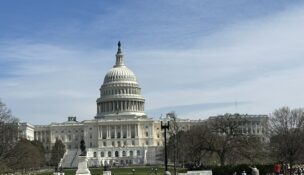Rule 41 Case Analysis
By: dmc-admin//August 6, 2003//
As a result of the decision, plaintiffs should be very leery of dismissing a federal action to pursue an action based on the same conduct in state court.
This is particularly true, because Wisconsin has an identical counterpart to Rule 41(d), which authorizes a court to stay a second action after a plaintiff has dismissed a previous one, until the costs are paid — Wis. Stats. sec. 805.04(4).
In a case such as this, where costs are apparently over $100,000, that could pose a substantial burden on a plaintiff for switching forums.
Furthermore, the court’s discussion of the powers of the state court after conclusion of the subsequent case is of questionable legality. The court stated, “Should M&F prevail on any of their state-law claims, however, they are free to ask the state court to award costs that include whatever sums they had to pay to the City in this litigation.”
| |
||
|
Seventh Circuit Court of Appeals |
||
| |
||
Certainly, they are “free to ask the state court,” for those costs, but the question is whether the state court is free to award them.
In Kleinke v. Farmers Coop. Supply & Shipping, 202 Wis.2d 138, 549 N.W.2d 714 (1996), the Wisconsin Supreme Court held it was unlawful for a trial court to award as costs, pretrial mediation fees, and photocopying medical records, appraisals, and exhibits.
The court held, “any award of a ‘cost’ which is not specifically authorized by a Wisconsin statute constitutes an error of law,” and quoted State v. Foster, 100 Wis.2d 103, 106, 301 N.W.2d 192 (1981), as follows: “The terms ‘ allowable costs’ or ‘taxable costs’ have a special meaning in the context of litigation. The right to recover costs is not synonymous with the right to recover the expense of litigation. This right is statutory in nature, and to the extent that a statute does not authorize the recovery of specific costs, they are not recoverable … Many expenses of litigation are not allowable or taxable costs even though they are costs of litigation.” Kleinke, 202 Wis.2d at 146-147.
Obviously, there is no statute which specifically authorizes recovery of costs incurred in a previous lawsuit. As such, the Seventh Circuit’s suggestion that a plaintiff ordered to pay the defendant’s costs in a federal suit could get that money back, or get back its own costs in the federal action, if it prevails in the state court action, is highly questionable.
– David Ziemer
Click here for Main Story.
David Ziemer can be reached by email.
Legal News
- Wisconsin Attorney General asks Congress to expand reproductive health services
- Attorney General Kaul releases update at three-year anniversary of clergy and faith leader abuse initiative
- State Bar leaders remain deeply divided over special purpose trust
- Former Wisconsin college chancellor fired over porn career is fighting to keep his faculty post
- Pecker says he pledged to be Trump campaign’s ‘eyes and ears’ during 2016 race
- A conservative quest to limit diversity programs gains momentum in states
- Wisconsin prison inmate pleads not guilty to killing cellmate
- Waukesha man sentenced to 30 years for Sex Trafficking
- 12-year-old shot in Milwaukee Wednesday with ‘serious injuries’
- Milwaukee man convicted of laundering proceeds of business email compromise fraud schemes
- Giuliani, Meadows among 18 indicted in Arizona fake electors case
- Some State Bar diversity participants walk away from program
WLJ People
- Power 30 Personal Injury Attorneys – Russell Nicolet
- Power 30 Personal Injury Attorneys – Benjamin Nicolet
- Power 30 Personal Injury Attorneys – Dustin T. Woehl
- Power 30 Personal Injury Attorneys – Katherine Metzger
- Power 30 Personal Injury Attorneys – Joseph Ryan
- Power 30 Personal Injury Attorneys – James M. Ryan
- Power 30 Personal Injury Attorneys – Dana Wachs
- Power 30 Personal Injury Attorneys – Mark L. Thomsen
- Power 30 Personal Injury Attorneys – Matthew Lein
- Power 30 Personal Injury Attorneys – Jeffrey A. Pitman
- Power 30 Personal Injury Attorneys – William Pemberton
- Power 30 Personal Injury Attorneys – Howard S. Sicula











